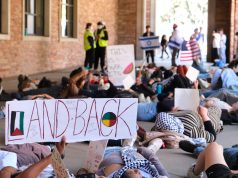Link to previous Story Worth Telling
I’m wearing a t-shirt that says ‘Don’t trust corporate media,’ but actually you can trust the corporate media and you should — to lie, to fabricate, to invent, to distort, to completely mislead you,” says David Barsamian. He’s the sitar-playing, Urdu-speaking founder of Alternative Radio, a Boulder-based independent program syndicated on more than 175 radio stations worldwide. Best known as a writer for his interviews with Noam Chomsky, Edward Said and Howard Zinn, Barsamian first came to radio as a volunteer at KGNU in the late 1970s as a total novice.
“This used to be a dentist’s office,” Barsamian says, looking humored during a tour of the Alternative Radio office off of Folsom Avenue in Boulder, stopping to point out a few dental hook-ups still hanging from the dead-white wall of a back room. The tiny, messy office where Alternative Radio is produced by Barsamian and two others gives the impression that its inhabitants are too busy to decorate and that the chaos is organized: books and newspapers are scattered, stacks of printer paper glow under fluorescent lights, a Canadian newspaper is spread open to a profile on Barsamian.
It was total serendipity, Barsamian says, that he became a radioman: “When I arrived at the old Stapleton airport in Denver [in 1978] the second thing the person meeting me said was, ‘Hey, a new community radio station went on the air and they’re looking for volunteers.’ It was pure random chance, I was in the right place at the right time, and I felt I had found my métier.”
He has the qualities of an investigative journalist, to be sure. Inquisitiveness had him doing his first informal interviews in the ’60s — the most difficult interview he says he ever did was with his mother, a refugee and survivor of the Armenian Genocide. Rebelliousness saw him drop out of college and lie his way onto a Norwegian freighter to work as a prep cook until he landed in Japan and began an Asian odyssey. Curiosity kept him in Asia for five years, hitchhiking across borders and studying the sitar and Raga music with a master musician in India.
Given that he hangs with the most intellectual crowd there is, it’s surprising and refreshing that Barsamian comes uncredentialed.
“I have no degrees to speak of,” he says. “Which in this work actually proves to be an advantage because I didn’t have to unlearn the propaganda that is primarily a lot of what ‘lower education,’ as I call it, provides. So I came to things pretty fresh, pretty raw. I’ve always been a rebel, even as a kid. I was asking lots of questions. Why? Why? I used to drive my mother crazy.”
Having gotten comfortable with the narrative form, interviews and radio technology at KGNU, Barsamian launched Alternative Radio in 1986, a platform, he says, for “dissidents and dissonance.”
“I’m using dissonance in a musical sense,” he explains. “We’re given this harmonic construction [by the media] The world is good; America is great. I want to trouble that harmonic construction with some dissonant notes. … Obama has said repeatedly, just like every president before him, that we are unique among the nations, we are indispensible, America’s values are singular, we have a burden to bear because of these values, history has placed us in this position. You’re getting into mysticism when politicians start talking about abstract things like providence and destiny to justify what they’re doing. I think we’re in pretty deep doo-doo at that point because they’re lying. Politicians present policies wrapped in benign intent. ‘We want to help the world,’ they say. ‘We want to liberate women in Afghanistan or some other country. We want to spread freedom and democracy.’ These are all terms of propaganda that conceal real intentions of people in power, which is to acquire resources, which is to extend U.S. hegemony over the rest of the world. The U.S. has 735 military bases around the world, it has thousands of bases inside the country, it spends more on the milimilitary than the next 10 countries combined, meanwhile emergency rooms and hospitals are closing, schools are closing, teachers are being underpaid and laid off.”
Barsamian’s clearest critique of American media is precisely this: It’s a package of innocuous noise, a “mass distraction,” he says, and turning citizens into consumers is their primary purpose. So the average American is virtually ignorant of the system of power in our own country.
“They get glimpses here and there, if there’s some enormous crisis,” Barsamian says. “But then it’s completely buried under the Kardashian sisters or the latest Madonna adoption.”
A world event snuffed out of popular media is the ongoing Indian occupation of Kashmir, a story of gross human rights violations — unmarked mass graves, thousands of Kashmiris having disappeared, all in the most densely militarized zone on the face of the planet.
“Most people find that quite surprising, even to hear these things about India, that 70,000 to 80,000 Kashmiris have been killed, that torture is routine there,” Barsamian says. “So the human rights violations are off the charts, what India is doing in Kashmir, but if you talk to most people here and mention India, what comes up? Great food, the Taj Mahal, sitar music, yoga, meditation, ashrams. India has been very skillful at selling itself to the West as this kind of Eden where people are meditating and are dwelling on the meaning of life. There’s a very good example of effective propaganda. Most Americans, when I tell them this, their answer is uniform: ‘I had no idea!’”
Barsamian’s work on the crisis in Kashmir, and his interviews with Indian dissidents like Arundhati Roy, got him kicked out of India, a country where he lived for years and says he feels “at home.”
In 2011 he went to India to follow up on an earlier story about unmarked graves that had been uncovered in Kashmir. He was detained at the airport and eventually deported, security officials citing an invalid passport although he had a valid visa.
Yet like the intellectuals and dissidents he broadcasts, Barsamian is tireless, despite obstacles.
“I’m trying to get back to India,” he says. “Actually, very soon.”
In the meantime, you can hear him every Wednesday at 6 p.m. on KGNU.
Respond: letters@boulderweekly.com
Link to next Story Worth Telling














































